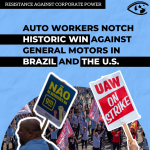INDIA: Japanese Investors Learn Indian Labour Laws the Hard Way
Japanese investors in India took a few hard
lessons in India's tough labour laws when the automobile giant Honda
Motors tamely resumed production at its plant outside the national
capital this week, ending three months of labour disputes, including
pitched battles between police and agitated workers.
''There are labour laws in this country and all could have been avoided
if the management (at Honda) had taken care to study them carefully before
setting out on a confrontationist path,'' D. Raja, national secretary of
the Communist Party of India (CPI), told IPS in an interview.
The showdown on Jul. 25 in Gurgaon, a glittering glass and chrome
township that falls in neighbouring Haryana state but borders the
national capital, also demonstrated the power of India's TV channels,
which broadcast the stiff resistance put up by Honda workers as police
tried to beat them into submission for protesting against the sacking of
57 employees and a month-old lockout.
More than 200 workers were hospitalised after the clashes, many of them
with broken heads and fractured limbs.
Thereafter, what was in essence a ''small micro-management problem''
snowballed into a first class row involving the Japanese ambassador to
India, Prime Minister Manmohan Singh and even Sonia Gandhi, leader of
the ruling Congress party and the country's most powerful politician.
And, in the process, it was brought home to foreign investors in India's
booming economy that this country was not about to abandon half-a-
century of economic independence - some would say stagnation û in the
name of the much coveted foreign direct investment (FDI).
When Ambassador Yasukuni Enoki remarked that the clashes would affect
FDI flows into this country, it brought on howls of protest from both
communists as well as supporters of the right-wing, nationalist,
Bharatiya Janata Party (BJP), which now leads the opposition in
parliament.
Columnists from across the political spectrum were soon falling over
each other to set the record straight for Enoki.
''Mumbling dark threats about FDI being throttled is nonsense. FDI is
not charity nor a grant in aid,'' wrote the syndicated columnist T.V.R.
Shenoy. He also pointed out that India itself presented a huge and
growing market for goods and services that foreign companies could not
ignore.
To be fair to Enoki, while he did say that the incident would be
a ''disadvantage for India's image as an FDI destination,'' he also
conceded that it had placed a ''negative image on Japanese
management.''
Enoki himself seemed to betray a lack of understanding of India's
vibrant democratic culture when he said that the dispute was getting
politicised. ''Such kind of interference should not be made by
political parties,'' he said, showing surprise at a development which is
commonplace in this country.
Reacting to Enoki's statements, a spokesman for India's External
Affairs Ministry said somewhat stiffly: ''The country's democratic
institutions and its legal system provide an effective mechanism to deal
with such incidents in a transparent manner.''
Said Nilotpal Basu, a member of parliament and leader of the Communist
Party of India ûMarxist (CPI-M): ''The fact is that India's labour laws
reflect international covenants like those of the International Labour
Organisation (ILO) and are accepted by most countries.''
''If the MNCs follow the labour laws in their own countries, they should
do it in India too,'' he added.
Yet, Congress party leaders -- certainly not the state-level leaders of
Haryana state, starting with Chief Minister Bhupinder Singh Hooda --
were taking Enoki's statements lightly, knowing well that more than half
of the 150 Japanese operating in the country are located in Gurgaon.
Said Kiyomichi Ito, chief of the joint-venture Toyota-Kirloskar Auto
Parts aggressively, ''Indians should understand that the capital
investor has varied choices and China still remains an attractive
destination.''
But another locally well-known Japanese businessman, Naohiko Munakata,
chairman of Mitsubishi Corporation, was more pragmatic and said the
incident provided a ''good lesson for Japanese management'' and that
there was a real need to understand cultural differences.
''We have to be more careful about local culture and sentiments and
Mitsubishi is determined to understand work culture in India better and
also conduct more business here,'' Munakata said.
Currently, India is seeing a boom in FDI as never before since the
country became independent from British rule in 1947 and last year the
rating firm A. T. Kearney placed India as third most attractive country
in its 'FDI Confidence Index.'
This year FDI worth close to seven billion U.S dollars has already been
Channelled, with a third of this coming from Japanese companies led by
Mitsubishi, which has just invested 500 million dollars in communist-
ruled West Bengal state.
At the end of the dispute in Gurgaon on the weekend, the Honda
subsidiary, which employs 2,000 workers and churns out 2,000
motorcycles and scooters a day, had to eat humble pie and reinstate all
the 57 workers it had fired, just as the trade union bosses had said all
along.
In a statement, Honda said its management had ''agreed to resolve the
current situation with certain one-time measures that would help in
normalising overall situation and promote goodwill and harmony'' not
just for the company but also ''for the entire region as well.''
Honda also agreed to increase salaries ''subject to whole-hearted
cooperation, proper conduct and the meeting of production targets.''
Many believe that the incident could be a precursor to further
industrial disputes in Gurgaon and other industrial centres across the
country involving foreign investors, whose activities were restricted
until India set on a path of liberalisation in 1991 following a balance
of payments crisis.
''The reinstatement is only a partial victory, we are now fighting to
get our comrades who were arrested released from jail,'' Gurudas
Dasgupta, the well-known CPI trade union leader and parliamentarian,
who led the strike, told IPS on Wednesday.
Dasgupta said the CPI and other communist parties were now gearing up
for a massive national strike to highlight ''the exploitation of workers
by multi-national corporations in the name of liberalisation and
globalisation'' on Sep. 29.
The communist parties provide critical outside support for the minority
Congress-led United Progressive Alliance (UPA) coalition that runs the
national government at the centre. They have warned that they would not
countenance any attempt to change or dilute existing labour laws which
the World Bank has described as ''restrictive.''
A World Bank study entitled 'Doing Business,' released earlier this
year, rated India as among countries with the most rigid labour laws
with a score of 48, while China had only 30 and Singapore zero.
Said CPI's Raja: ''Please do not forget that this country offers no
social security or unemployment insurance to workers and until that
happens we will not allow the kind of hire and fire polices that the
multi-nationals are demanding in the name of labour reforms.''
- 193 Transportation



